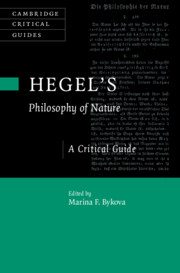Book contents
- Hegel’s Philosophy of Nature
- Cambridge Critical Guides
- Hegel’s Philosophy of Nature
- Copyright page
- Dedication
- Contents
- Contributors
- Acknowledgments
- Abbreviations
- Hegel’s Philosophy of Nature
- Part I Hegel’s Philosophy of Nature in the Historical and Systematic Context
- Part II Cosmology, Mechanics, and Physics
- Part III Organics
- Part IV On Contemporary Challenges for the Philosophy of Nature
- Bibliography
- Index
- Cambridge Critical Guides
- References
Bibliography
Published online by Cambridge University Press: 19 December 2024
- Hegel’s Philosophy of Nature
- Cambridge Critical Guides
- Hegel’s Philosophy of Nature
- Copyright page
- Dedication
- Contents
- Contributors
- Acknowledgments
- Abbreviations
- Hegel’s Philosophy of Nature
- Part I Hegel’s Philosophy of Nature in the Historical and Systematic Context
- Part II Cosmology, Mechanics, and Physics
- Part III Organics
- Part IV On Contemporary Challenges for the Philosophy of Nature
- Bibliography
- Index
- Cambridge Critical Guides
- References
- Type
- Chapter
- Information
- Hegel's Philosophy of NatureA Critical Guide, pp. 293 - 308Publisher: Cambridge University PressPrint publication year: 2024

